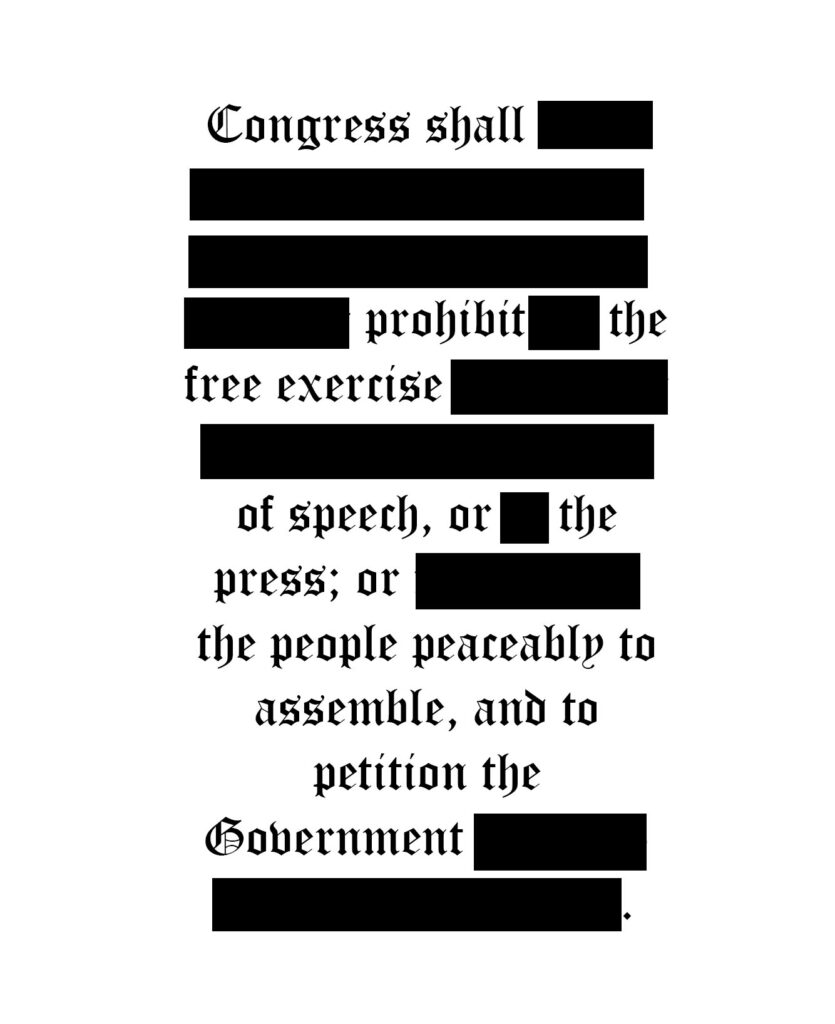The following is an excerpt from Fragments, the new magazine from Emor.
by Jonathan Backer1
Alan Leveritt is the CEO and publisher of a small, progressive newspaper called the Arkansas Times. For years, the Times contracted with the University of Arkansas’s Pulaski Technical College to run ads for the college. In 2018, Pulaski Tech asked the Times, as a condition of renewing its contract, to sign a pledge that the newspaper would not participate in any consumer boycott against Israel during the contract’s duration. This was an odd request. After all, the Times largely reports on local issues, and it participates in no such boycotts. Leveritt refused to sign the pledge, however, because, in his words, “We don’t take political positions in return for advertising.”2
Pulaski Tech’s strange ultimatum was the result of an Arkansas law adopted in 2017 that precludes state contractors from participating in boycotts against Israel and the occupied Palestinian territories. And Arkansas’s law is far from an outlier. Over 30 states have adopted similar laws in opposition to the global Boycott, Divestment, and Sanctions (BDS) movement, which targets Israel with consumer boycotts and divestment initiatives over the country’s treatment of Palestinians.3
Some Jewish groups, like the Anti-Defamation League, have encouraged states to adopt these anti-BDS laws as a way of wielding state fiscal power against the global BDS movement.4 And other prominent Jewish organizations, like the American Jewish Committee and the Union of Orthodox Jewish Congregations of America, have defended anti-BDS laws in cases brought by Arkansas Times and others challenging such laws on First Amendment grounds.5

Reasonable minds within the Jewish community can and do differ over whether boycotts against Israel are warranted. But there should be no dispute over the general proposition that consumer boycotts are an important form of political expression. Political and social movements throughout history have relied on consumer boycotts as a way of expressing opposition to governments and their policies. Boycotts against British goods were part of the kindling for the American Revolution. The Montgomery Bus Boycott helped dismantle Jim Crow. South Africa’s Apartheid regime crumbled in part because of a global boycott movement. And in the wake of Adolf Hitler’s rise to power, American Jews opposed Nazism by boycotting German goods.
Given the importance of consumer boycotts to those and other movements, the Supreme Court — unsurprisingly — has recognized that the First Amendment protects the right to boycott. In the 1982 case NAACP v. Claiborne Hardware Co., the Court reversed a state-court judgment holding civil rights organizers liable for financial losses experienced by white-owned businesses in Port Gibson, Mississippi, stemming from a boycott aimed at promoting racial equality and integration in that city. Each “element[] of the boycott,” the Supreme Court held, “is a form of speech or conduct that is ordinarily entitled to protection” under the First Amendment. Accordingly, state tort law could not be used to punish the boycott’s organizers.
In cases challenging the constitutionality of anti-BDS laws, however, states have argued, in spite of Claiborne Hardware, that there actually is no First Amendment right to boycott.6 By myopically focusing on individual purchasing decisions — as opposed to boycotts’ aggregate economic impact — states argue that boycotts are not expressive conduct entitled to First Amendment protection because there is no way to distinguish politically motivated purchasing decisions from those motivated by apolitical consumer preferences.
No matter their Israel politics or their views on the global BDS movement, Jewish organizations and their members and supporters should think carefully about the unintended consequences of defending anti-BDS laws from First Amendment challenge. As two examples show, Jews were among the victims of government censorship and repression during earlier epochs of American history before courts had established robust First Amendment protections.
In 1917, Congress enacted the Espionage Act, which, among other things, gave the Postmaster General the power to crack down on supposedly subversive publications.7 The Jewish Daily Forward, the famous socialist Jewish newspaper, opposed the war and American entry into it. Editor Abraham Cahan had written, for instance, “A war means destruction, the corruption of all of the blessings that civilization brings. War means a retreat backwards, a return to darkness.”8 Using his newly-granted authority, Postmaster General Albert S. Burleson threatened to revoke the Forward’s second-class postage rates, which would have bankrupted the newspaper.9 Louis Marshall, a prominent lawyer and one of the founders of the American Jewish Committee, successfully interceded on behalf of the Forward to preserve the newspaper’s mail privileges, but at a heavy price.10 Cahan pledged to cease publication of pacifist articles, and Marshall promised Burleson that he would act as a “private censor” and identify any Forward articles that “could be considered as contrary to the public interests.”11 The Forward kept its doors open, but only by succumbing to censorship.
During the McCarthy Era, congressional committees including the infamous House Un-American Activities Committee (HUAC) and Senator Joseph McCarthy’s Permanent Subcommittee on Investigations delved into individuals’ private associations in an attempt to uncover supposed Communist affiliations. Fear of those investigations prompted Americans to engage in widespread private censorship and even self-censorship to avoid being branded as Communist sympathizers.12 One target of those largely unchecked investigations was a Jewish woman named Anna Rosenberg, whom Secretary of Defense George C. Marshall nominated in 1950 to be Assistant Secretary of Defense.
After receiving a unanimous confirmation vote in the Senate Committee on Armed Forces, rumors began circulating that Rosenberg had associated with or been a member of the Communist Party in the 1930s. Openly antisemitic supporters of Senator McCarthy — Gerald L.K. Smith, Wesley Swift, and Benjamin Freedman — lobbied Congress in an attempt to defeat Rosenberg’s nomination. Freedman obtained files from HUAC showing that someone named Anna Rosenberg belonged to a Communist literary society in the 1930s. He also engineered unreliable testimony by a witness who claimed to have known Rosenberg when she had supposedly been active in Communist circles.13

Rosenberg eventually secured Senate confirmation, in part because Jewish leaders rallied to her defense.14 But the episode had a chilling effect on the American Jewish community by making unmistakably clear that any Jew attempting to enter public life would be forced to put their political associations under the microscope and that their careers could be threatened by real or fabricated ties to the Communist Party. An Anti-Defamation League publication described Rosenberg as “a latter-day Dreyfus,” invoking the name of the Alsatian French military officer of Jewish descent who was convicted on trumped-up espionage charges in 1894.15 And the ADL’s national director, Benjamin Epstein, warned that all Jews were “targets” of the Rosenberg affair because “[t]he goal was to keep Jews out of Washington and out of public office; to label them as unreliable citizens, as second grade citizens, as traitors.”16
The above examples demonstrate that the Jewish community has a vested interest in the strong First Amendment protections that courts recognized in the second half of the twentieth century. As Reform Jewish leaders Albert Vorspan and Rabbi David Saperstein wrote, “If American Jews have attained an unprecedented measure of security and success in America, one major reason is the majestic sweep of the Constitution and the Bill of Rights.”17 Jewish organizations might see short-term benefit in defending anti-BDS laws by arguing for exceptions to the First Amendment. But, in the long term, a weakened First Amendment poses a far greater threat to the Jewish community than any boycott against Israel.
Author’s note: The Supreme Court recently declined to hear Arkansas Times’s challenge to Arkansas’s anti-BDS law. T’ruah, J Street, Americans for Peace Now, and Partners for a Progressive Israel filed an amicus brief encouraging the Court to take the case and making clear the threat that anti-BDS laws pose to First Amendment protections and therefore the American Jewish community.18 Although the Court’s decision not to hear the case means that Arkansas’s anti-BDS law will remain on the books, other legal challenges to other anti-BDS laws remain pending.
1 Jonathan Backer is an attorney at the U.S. Department of Justice’s Civil Rights Division. This article reflects only Mr. Backer’s views and not the views of the United States. Prior to joining the Civil Rights Division, Mr. Backer worked at the Institute for Constitutional Advocacy and Protection (ICAP) at Georgetown University Law Center. At ICAP, Mr. Backer was the primary author of several amicus briefs that T’ruah and J Street filed in support of plaintiffs challenging anti-BDS laws. This article draws on those briefs.
2 Alan Leveritt, Guest Essay, We’re a Small Arkansas Newspaper. Why is the State Making Us Sign a Pledge About Israel?, N.Y. Times (Nov. 22, 2021), https://www.nytimes.com/2021/11/22/opinion/israel-arkansas-bds-pledge.html.
3 Laws in US States Targeting Boycotts of Israel and/or Settlements 2014-Present, Foundation for Middle East Peace, https://fmep.org/wp/wp-content/uploads/State-BDS-and-Settlement-legislation-table.pdf (last updated Jan. 13, 2023).
4 Alex Kane, How the ADL’s Israel Advocacy Undermines Its Civil Rights Work, Jewish Currents (Spring 2021), https://jewishcurrents.org/how-the-adls-israel-advocacy-undermines-its-civil-rights-work.
5 E.g., Am. Jewish Comm. Amicus Br., Ark. Times LP v. Waldrip, 37 F.4th 1386 (8th Cir. 2022) (en banc) (No. 19-1378); Agudath Israel, Union of Orthodox Jewish Congregations of Am., StandWithUs Amicus Br., Ark. Times, 37 F.4th 1386.
6 E.g., Appellees’ Br. at 15, Ark. Times LP v. Waldrip, 37 F.4th 1386.
7 Pub. L. No. 6524, tit. XII, 40 Stat. 217, 230–31.
8 Ab Cahan, A Terrible Blood Bath, Forward (June 25, 2014), translated and archived at https://forward.com/news/200451/a-terrible-blood-bath/.
9 Mike Wallace, Greater Gotham: A History of New York City from 1898 to 1919, at 991 (2017); 2 Zosa Szajkowski, Jews, Wars, and Communism: The Impact of the 1919-20 Red Scare on American Jewish Life 30 (1974).
10 Irving Howe, World of Our Fathers 539–40 (NYU Press 2005) (1976); Moses Rischin, The Early Attitude of the American Jewish Committee to Zionism (1906–1922), 49 Publications of the Am. Jewish Hist. Soc’y 188, 196 (1960).
11 Letter from Louis Marshall to Postmaster General A. S. Burleson (Jan. 5, 1918), reprinted in 2 Louis Marshall: Champion of Liberty 975 (Charles Reznikoff ed., 1957).
12 Seth F. Kreimer, Censorship by Proxy: The First Amendment, Internet Intermediaries, and the Problem of the Weakest Link, 155 U. Pa. L. Rev. 11, 42–46 (2006).
13 Aviva Weingarten, Jewish Organisations’ Response to Communism and to Senator McCarthy 112-115 (2008).
14 Stuart Svonkin, Jews Against Prejudice 121 (1997).
15 Id. at 120 (quoting 7 ADL Bulletin, Dec. 1950, at 5).
16 Id. (quoting 8 ADL Bulletin, Jan. 1951, at 2).
17 Albert Vorspan & David Saperstein, Tough Choices: Jewish Perspectives on Social Justice 40 (1992).
18 Truah et al. Amicus Br., Arkansas Times LP v. Waldrip, No. 22-379 (S. Ct.) (Nov. 18, 2022), https://www.supremecourt.gov/DocketPDF/22/22-379/246926/20221118112144974_Truah%20et%20al%20Amici%20Brief.pdf.

Jonathan Backer is an attorney at the U.S. Department of Justice’s Civil Rights Division. Mr. Backer’s views are his own and do not reflect the views of the United States. Before joining the Civil Rights Division, Mr. Backer was an attorney at the Institute for Constitutional Advocacy and Protection (ICAP) at Georgetown University Law Center, and he served as a law clerk at the U.S. Court of Appeals for the Sixth Circuit and the U.S. District Court for the District of Maryland and as a foreign law clerk at the Supreme Court of Israel. Mr. Backer is a graduate of Columbia University and University of Michigan Law School.
